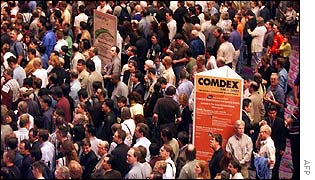In a blog posting, Steve Johnson of Pragmatic Marketing asks “Why Demo at Trade Shows?” Good question.
Abridged version
Why demo?
Steve writes:
Do we think that the product will sell itself? … Instead I fear that we’re showing too much too soon in the sales cycle and turning off our potential buyers.
I have to ask the question: Steve, what evidence is there that trade show demos turn OFF potential buyers?
Steve, you bought an iPhone right? Steve Jobs demo’d it at an Apple Conference a few months before they went on sale. What was the sales cycle that ensued that convinced you (and 100,000+ others) to get it as soon as it was available? I’m pretty sure it sold itself. 🙂
Full version
Why demo?
Why even attend trade shows at all for that matter? All those airline tickets and hotel rooms, not to mention trade show booth rentals, cost serious $$$. And then there are all those people who just come to your booth to get the nifty pen or other cool swag you have on hand.
What a bother!
But let’s get back to to the original post. Steve writes:
Back in its heyday, Comdex estimated that they threw away two tons of product literature every day. If they don’t keep the collateral, will they remember the demo?
Steve, a bit of logical fallacy here don’t you think? Sure, people throw away literature at trade shows. That doesn’t mean they throw away ALL of their literature, and it doesn’t at all imply they suffer from memory loss. 🙂
 At it’s peak, Comdex attracted about 200,000 attendees. A bit of math (the numbers work out quite conveniently), and we see that (2 tons) 4000 lbs / 200,000 people = .02 lbs per person of wasted literature each day.
At it’s peak, Comdex attracted about 200,000 attendees. A bit of math (the numbers work out quite conveniently), and we see that (2 tons) 4000 lbs / 200,000 people = .02 lbs per person of wasted literature each day.
That’s about 9 grams per person. Not really a lot when you think about it. So, if people aren’t actually throwing that much away, maybe they are remembering the demo?
Later Steve writes:
Do we think that the product will sell itself? … Instead I fear that we’re showing too much too soon in the sales cycle and turning off our potential buyers.
I have to ask the question: Steve, what evidence is there that trade show demos turn OFF potential buyers?
Steve, you bought an iPhone right? Steve Jobs demo’d it at an Apple Conference a few months before they went on sale. What was the sales cycle that ensued that convinced you to buy it? I’m pretty sure it sold itself. Or at the very least, the Steve Jobs reality distortion field helped convince you to buy it.
BTW, if the product can’t sell itself, whose fault is that? Sure not all technology products are right for trade show demos, but that doesn’t mean none of them are. I had a wonderful experience a while back demoing a software product at a show. Could have sold lots of licenses on the floor if it were possible.
Many people attend technology trade shows explicitly for the opportunity to see a live demo of a product and speak directly to savvy personnel from the company that makes the product.
 Ever watch a late night infomercial? They are nothing but extended demos of the products — kitchen devices, exercise machines, you name it. And boy do they sell product. One of most popular products sold by infomercial is the Showtime Rotisserie, pictured here. It is claimed that over 7 million units have been sold, generating revenues of over $1,000,000,000 dollars.
Ever watch a late night infomercial? They are nothing but extended demos of the products — kitchen devices, exercise machines, you name it. And boy do they sell product. One of most popular products sold by infomercial is the Showtime Rotisserie, pictured here. It is claimed that over 7 million units have been sold, generating revenues of over $1,000,000,000 dollars.
Steve continues:
Do the sales people demand it? Demo-selling is the laziest kind of selling. It says, “I don’t want to know you or learn your business. I just want to get you to buy as quickly as possible.”
I have to respectfully disagree here. First of all, as mentioned earlier, many people go to shows with the expressed intent to see the product and get a demo. Demo-selling is only lazy IF the vendor explicitly doesn’t want to listen to the prospect. In fact, if that is the case, it is not only lazy, but incredibly foolish as well. And yes, some companies do behave that way, but many companies don’t.
The great thing about trade shows is that in exchange for a short (not necessarily canned) demo of the product, I get to have face to face conversations with potential buyers. What’s my response to someone who comes to the booth and says:
“Hi, can I get a demo of your product?”
I say,
“Yes, absolutely. But first can you tell me a bit about yourself and what you are looking to do with a product like ours?”
If the person bites and responds to the question, then I have them. I can ask them a few more qualifying questions and if they fit the profile I’m looking for, I can get into a demo with them and continue the conversation, asking questions, probing for information etc. If they don’t fit the profile I can still give them the demo I promised, but I can decide how deep or not to take it. In the end, I get what I want, and they get want they want. Seems reasonable to me.
Later Steve writes:
Why do we demo at trade shows? Because everyone is doing it? My mother used to ask, “If everyone jumped off a cliff, would you?”
My mother used to say the same thing, but never in the context of tradeshows. 🙂
![]()

Just because everyone is doing it, it doesn’t mean it’s stupid.
I have a friend who was vacationing in Thailand a couple of years ago. He was sitting down to have breakfast with his wife and son. As they were eating breakfast on the restaurant patio, they started noticing people running up the road. As they watched, the number of people running up the road continued to increase. Many of the people were yelling in Thai as they ran by. My friend didn’t understand Thai. But, he figured that if so many people were running up the road, he and his family should do it as well. They abandoned their breakfast and ran along with the throngs of other people, not knowing why everyone was running.
The date was December 26, 2004. The people were all running up the road away from the beach and the massive tsunami that was bearing down on them. We don’t always have all the data to make well reasoned decisions on what to do, but many times, by observing crowds, we may get insight that delivers significant benefit.
There certainly are ways to have bad demos and to promote and sell products poorly. Some companies do it far too regularly, by focusing on their own features and functionality and not understanding the customer’s frame of reference. But that has nothing to do with a trade show. Alan blogged about this in one of his posts.
Steve concludes:
At your next event, try just asking people who come by the booth a few simple qualifying questions about their problem and its urgency to them. If they answer in the affirmative, scan their badge or take their card and invite them to enjoy the show. Meanwhile send a set of materials to them through the mail or better yet, have a sales person contact them the week after the show. Nobody retains information from a trade show–everyone is yelling to be heard. Perhaps you could be a little quieter and much more effective. Let’s use the demo where it belongs, much later in the sales cycle.
Steve, that’s an interesting idea. We have a big product launch coming up in September. We’re announcing the product at a big trade show at the Moscone Center in San Francisco. Now, I’m wondering, what would be the reaction of someone who took time off work, came down to the Moscone Center (maybe they are local, maybe they flew in for the show), and came to our booth and after a short interchange, I scanned their badge and sent them off to the next company of interest.
Hate to say it, but I doubt the impression would be a good one. What ROI are they getting from me, having spent time and money to come to my booth? A handshake, a short conversation and a “we’ll have a sales rep contact you next week“?
I’ll think about your idea. But to be honest, when I have the opportunity to have a high touch, high value direct conversation with a good prospect, I’m going to take it.
Saeed